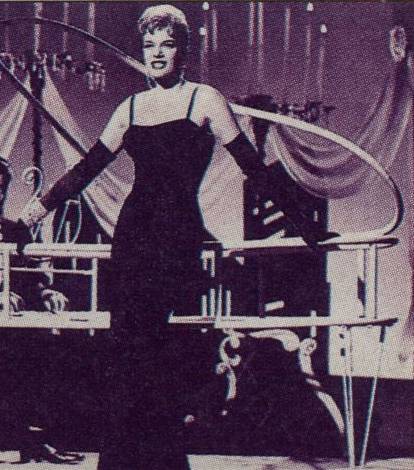By Lisa Hallett, Soap Opera Update, 1990
|
|
Home | Cette page en Français |
| Make room for daytime | |||||
|
By Lisa Hallett, Soap Opera Update, 1990 |
|
||||
 Catch
Janis Paige in classic film musicals and you'll see why she was discovered at
seventeen while performing operatic arias at the legendary Hollywood
Canteen. There she is with Fred Astaire in Silk Stockings,
slithering around in a black bustier, all legs and shoulders, with lustrous
Technicolor red hair, and bone structure that could hold up in a South Carolina
hurricane. "I danced with him in stereophonic sound," she says. "Oh, God, that
was wonderful." If
you went to the theater in the 1950s, you might have seen her in The
Pajama Game, playing John Raitt's (Bonnie's dad) leading lady. In her
first Broadway musical, the statuesque Scandinavian from Tacoma, Washington, won
raves from such venerable critics as Walter Kerr ("... Janis Paige is pretty and
spirited as the hard-to-get girl") and the Time's Brooks Atkinson
("... her voice is almost as exhilarating as her shape").
Catch
Janis Paige in classic film musicals and you'll see why she was discovered at
seventeen while performing operatic arias at the legendary Hollywood
Canteen. There she is with Fred Astaire in Silk Stockings,
slithering around in a black bustier, all legs and shoulders, with lustrous
Technicolor red hair, and bone structure that could hold up in a South Carolina
hurricane. "I danced with him in stereophonic sound," she says. "Oh, God, that
was wonderful." If
you went to the theater in the 1950s, you might have seen her in The
Pajama Game, playing John Raitt's (Bonnie's dad) leading lady. In her
first Broadway musical, the statuesque Scandinavian from Tacoma, Washington, won
raves from such venerable critics as Walter Kerr ("... Janis Paige is pretty and
spirited as the hard-to-get girl") and the Time's Brooks Atkinson
("... her voice is almost as exhilarating as her shape").
In a career that spans four decades, Janis Paige has also made room for daytime. In the final days of Capitol, she was Laureen Clegg, and last year she played Iona Hutchinson on General Hospital. Most recently, she was relocated to Santa Barbara as the resurrected Minx Lockridge, once played by Dame Judith Anderson.
Janis is a charming woman who is a true survivor of a business that can be more cruel than it is kind. In her tiny, temporary dressing room, Janis laughingly pushes aside the mess of clothes and papers and offers her visitor coffee. Still statuesque, the silver-blonde actress is wearing a striking black Jane Fonda Workout sweatsuit and white tennis shoes. In conversation, she frequently refers to your name or calls you "honey" - a personable tool you can tell she's used throughout her career.
Setting up appearances and interviews between rehearsals, the actress is excited about her new part on Santa Barbara, and about the soap routine. "There's nothing like being on a sound stage," she says, "where there's a makeup department and you see the same people every day and get to know them. You become like a family. I've watched (soaps) throughout my life, especially when I was on Broadway. I went to bed late and I'd get up late." She found her parts on Capitol and General Hospital "fascinating and difficult. Many demands are made on you as an actor – very fast choices and fast decisions. Very little rehearsal. I think as actors in this business today – unless you have a run on Broadway, a play or you have an ongoing series – you don't have enough time to work. With a soap, they give you everything in the world to do. It's really a marvelous proving ground for yourself."
Janis Paige proved herself in the Hollywood studio system, first at MGM and then at Warner Bros.. After her parents divorced, Janis and her mother set their sights on Hollywood. In 1944, her mother was working in the kitchen and Janis was on stage at the Hollywood Canteen, when a scout for Louis B. Mayer requested that her mother bring Janis to MGM for a screen test. According to Janis, she never tested. "They just signed me and put me in a picture called Bathing Beauty with Esther Williams and Red Skelton," she says. "I had one line and a musical number with them."
Nevertheless, the cameo role made headlines in Tacoma, and her career was humming. Warner Bros. picked her up after MGM let her go; they put her in a picture called, appropriately enough, Hollywood Canteen. During her five years at Warner Bros., Paige was cast in various supporting roles, usually as the second lead's girlfriend or "the other woman". In those days, she says : "We were all typecast. They gave me leading lady roles a few times, but found the comedy in me, and the fact that I could sing and dance, and put me in that category. Just like they did with Jane Wyman (ex-Angela, Falcon Crest), until she did Johnny Belinda and they took her seriously. You get typecast, but it was so grateful to be there and so excited. If you're a kid and you've grown up with Joan Crawford and Humphrey Bogart and John Garfield, and they're walking toward you on the lot – it was just incredible. My life, looking back, has been a series of incredible occurrences, of being in the right place at the right time, or making the right choices. I made wrong choices, too," she adds.
 In
1949, Warner Bros. did not renew her contract, and Paige "couldn't get arrested"
in Hollywood. But she was through with Hollywood herself at the time, although
she didn't realize it until she was on a film set in war-torn Rome. "The Germans
had gone through and destroyed the reservoirs, so you had these beautiful
apartments and no water," she recalls. "You'd have to go to the well in the
piazza and get it. But I stayed there five months, and it was a life-changing
experience." Next, Paige set her sights on Broadway, and on a "fluke" landed a
plum role opposite Jackie Cooper in Remains to Be Seen. "They had
interviewed over two hundred women for that role. And I walked in and announced
that I didn't know the first thing about going on the stage and that this was
not something I felt I could do. They gave me the part," she laughs. "It was
just insane."
In
1949, Warner Bros. did not renew her contract, and Paige "couldn't get arrested"
in Hollywood. But she was through with Hollywood herself at the time, although
she didn't realize it until she was on a film set in war-torn Rome. "The Germans
had gone through and destroyed the reservoirs, so you had these beautiful
apartments and no water," she recalls. "You'd have to go to the well in the
piazza and get it. But I stayed there five months, and it was a life-changing
experience." Next, Paige set her sights on Broadway, and on a "fluke" landed a
plum role opposite Jackie Cooper in Remains to Be Seen. "They had
interviewed over two hundred women for that role. And I walked in and announced
that I didn't know the first thing about going on the stage and that this was
not something I felt I could do. They gave me the part," she laughs. "It was
just insane."
Her next Broadway show was the 1955 hit musical comedy The Pajama Game. It ran for fifteen months. "We were the happiest bunch of people you ever saw in your life," she says, "because everybody said we were going to be a flop. A show about a pajama factory ? And we were a smash. It was a special time – it will never come again. Life was simpler then. People weren't so introspective. We were amused much easier, much more simply."
After movies, nightclubs, vaudeville and Broadway, there was only one other medium for Janis Paige to tackle : television. With her customary aplomb, she landed her own series, called It's Always Jan, which ran for one season. The competition proved too tough. "That was the year Lawrence Welk smasharooed into everybody's lives. He put me off, Jane Wyman and Sid Caesar off. We all bit the dust."
But not for long. By then, the resilient redhead was used to picking herself up and dusting off any defeats. She made the films Silk Stockings, Please Don't Eat the Daisies, and her personal favorite, The Caretakers, with Joan Crawford ("She was a wonderful friend to me"). She also got married for the third and most satisfying time to composer-lyricist Ray Gilbert (a best song Oscar-winner for Zip-a-Dee-Doo-Dah). Following his death in 1976, the performer became an executive when she ran his music publishing business. Paige eventually handed it over to the Songwriters Guild, but she stills sits on the board.
In a career that has criss-crossed both continents and media, there are a few mementos that Paige keeps. One is an old lavender bag that she carried from city to city when she was on the road. "You should see it. It's got stickers from all over the world covering it and is in very bad shape, but I used to keep it packed with a coffee cup, some old silver, a paring knife, a can opener, a corkscrew and various plastic pieces. I'd pack it with crackers and cheese and grapefruit and whatever else I could find. The windowsill outside the hotel room in the winter was the greatest refrigerator in the world."
Another memento she has is an exit sign from the Hollywood Canteen. The day they tore it down "to make it into a parking lot or something," she got a call from a newspaperman named Alex Dreier, who asked her to come down and talk about it. "I threw some clothes and makeup on and drove down, and they were ripping it to pieces," she says. "The courtyard was still there with all the names of the boys who walked across the cement. I just took a phone and walked through and they filmed it, did a half-hour on it. They gave me the exit sign and gave two or three big pieces of the courtyard, the cement, and I have them in my backyard. That's all that's left."
The capricious nature of the entertainment business has taught the actress to take things "one day at a time. I learned that philosophy jumping horses. I was out at Flintridge, and I was showing and jumping and my teacher, Jimmy Williams, said to me one day : "Janis, one jump at a time. You do not look at the eight jumps. You jump this, you gather your horse up, you get your pace going and you jump the second jump. You look ahead and you jump the third." And it's something that stayed with me... We're all on overload in this world today. You, me, everybody. You allow all that stuff to come at you, and it will come at you. And you'll be fragmented all the time. You won't get anything done." As life philosophies go, it has certainly made all the difference for Janis Paige.